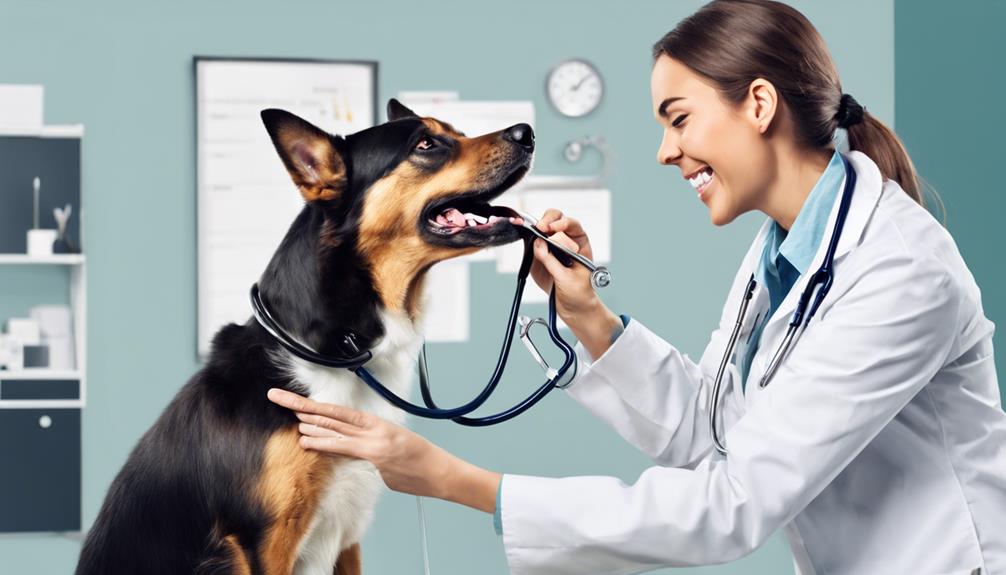Essential Dog Care Tips for New Owners
As a new dog owner, did you know that approximately 55% of American households have pets, with dogs being the most common furry companions? Understanding the key aspects of caring for your new four-legged friend is crucial to ensure a happy and healthy life together.
From establishing routines and providing proper nutrition to training tips and health monitoring, there are essential guidelines to follow. Stay tuned to discover how you can best cater to your dog's needs and foster a strong bond with your new pet.
Understanding Your Dog's Needs
To properly care for your new dog, you must first understand their needs. Behavioral training is crucial for ensuring your dog behaves well in various situations. Consistent training helps establish boundaries and reinforces positive behaviors. It's essential to use positive reinforcement techniques such as treats and praise to encourage good behavior and discourage unwanted actions.
Mental stimulation is another vital aspect of caring for your dog. Dogs are intelligent animals that require mental exercise to stay healthy and happy. Providing interactive toys, puzzle games, and training sessions can help keep your dog mentally engaged and prevent boredom. Mental stimulation not only keeps your dog entertained but also strengthens the bond between you and your furry friend.
Understanding your dog's needs for behavioral training and mental stimulation will contribute to a harmonious relationship between you and your new companion. By meeting these needs, you're setting the foundation for a well-behaved and contented dog.
Establishing a Routine for Your Dog
Creating a consistent daily schedule is key to providing structure and stability for your new dog. Start by establishing set times for activities like potty breaks and meals. Consistency is crucial for successful potty training. Take your dog outside first thing in the morning, after meals, and before bedtime. Praise and reward them when they go potty outside to reinforce good behavior.
In addition to potty training, maintaining a regular meal schedule is important for your dog's well-being. Feed your dog at the same times each day to help regulate their digestion and prevent accidents in the house. Make sure to provide a balanced diet suitable for your dog's age, size, and breed.
Alongside potty breaks and meals, incorporate daily exercise and playtime into your routine. Dogs thrive on routine, and having a predictable schedule will help them feel secure and happy in their new home. Remember, patience is key as your dog adjusts to their new routine.
Providing Proper Nutrition for Your Dog
Establishing a routine for your dog includes not only setting times for potty breaks and meals but also ensuring you provide proper nutrition for their overall well-being. Meal planning is crucial to keep your dog healthy and energetic. Choose high-quality dog food that meets their specific nutritional needs based on factors like age, size, and activity level. Look for options with real meat as the main ingredient and avoid foods with excessive fillers or artificial additives. Additionally, consider incorporating dietary supplements into their diet under the guidance of your veterinarian to address any specific health concerns or deficiencies.
When planning your dog's meals, make sure to follow recommended portion sizes to prevent overfeeding or underfeeding. Treats should be given in moderation and not replace regular meals. Remember to provide fresh, clean water at all times to keep your dog hydrated. By prioritizing proper nutrition and meal planning, you can help your furry friend lead a long and healthy life.
Regular Exercise and Playtime
Make sure your dog gets sufficient exercise and playtime to maintain their health and happiness. Regular physical activity is essential for your furry friend's overall well-being. Interactive toys are a great way to keep your dog mentally stimulated while providing physical exercise. These toys challenge your dog's problem-solving skills and keep them engaged for hours. Additionally, outdoor adventures are fantastic for giving your dog the opportunity to explore and expend energy. Whether it's a trip to the park, a hike in the woods, or a game of fetch in the backyard, outdoor activities are beneficial for both physical and mental health.
Engaging in regular exercise not only helps in preventing obesity and related health issues but also strengthens the bond between you and your dog. It's a time for both of you to have fun, stay active, and enjoy each other's company. So, grab those interactive toys and head outdoors for some quality playtime with your beloved pet.
Grooming and Hygiene Practices
Ensuring your dog's grooming and hygiene practices are consistent is crucial for their overall health and well-being. Regular grooming not only keeps your furry friend looking good but also helps prevent health issues. Here are some essential grooming and hygiene tips to keep in mind:
- Bathing Techniques: Use a dog-specific shampoo and wash your pup every 4-6 weeks, adjusting based on breed and activity level.
- Coat Care: Brush your dog's coat regularly to prevent matting and remove loose fur, especially important for long-haired breeds.
- Dental Hygiene: Brush your dog's teeth regularly with a dog-friendly toothpaste to prevent dental problems and bad breath.
- Nail Trimming: Keep your dog's nails trimmed to a safe length, avoiding overgrowth that can cause discomfort and issues with walking.
Training and Socialization Tips
To build a strong bond with your new furry companion, incorporating effective training and socialization techniques is key. Behavior modification plays a crucial role in shaping your dog's actions. Consistency and positive reinforcement are essential tools for teaching desired behaviors and correcting unwanted ones. Remember to reward good behavior promptly to reinforce it.
Enrolling your puppy in puppy classes is a great way to introduce them to other dogs and people in a controlled environment. These classes provide valuable socialization opportunities that can help prevent behavioral issues in the future. Additionally, they offer a structured setting for learning basic commands and proper behavior around distractions.
Socialization should be a continuous process throughout your dog's life. Exposing them to various environments, sounds, and people can help them become well-adjusted and confident companions. Regular social interactions can prevent fearfulness and aggression towards unfamiliar stimuli. By investing time and effort into training and socialization, you can set your dog up for a happy and fulfilling life by your side.
Health Monitoring and Vet Visits

Regularly monitoring your dog's health and scheduling routine vet visits are crucial steps in ensuring their well-being. Keeping up with vaccination schedules and preventative care is essential for preventing diseases and maintaining your furry friend's health.
Additionally, considering health insurance can provide financial assistance during unexpected medical emergencies. Being prepared for emergencies is vital; create a first aid kit and know the nearest 24-hour veterinary clinic in case of urgent situations. Remember, early detection of health issues can lead to more effective treatments and better outcomes for your dog's health in the long run.
- Stay updated on vaccination schedules and preventative care.
- Consider investing in health insurance for your dog.
- Be prepared for emergencies by having a first aid kit ready.
- Know the location of the nearest 24-hour veterinary clinic for urgent situations.
Creating a Safe Environment at Home
Monitor your dog's surroundings at home to ensure a safe environment free of potential hazards. Start by puppy-proofing your living space. Keep electrical cords, small objects, and toxic substances out of reach. Consider safety measures like securing cabinets and trash cans to prevent your furry friend from getting into things they shouldn't.
Additionally, invest in dog-friendly decor and set up your home with your pet in mind. Opt for sturdy furniture that can withstand your dog's energy and consider slip-resistant rugs to prevent accidents. Create designated spaces for your dog, such as a cozy bed or a crate, where they can feel safe and secure. Make sure to have a comfortable area for your dog to rest and provide plenty of toys for mental stimulation.
Frequently Asked Questions
How Can I Help My Dog Overcome Separation Anxiety?
To help your dog conquer separation anxiety, try training techniques like desensitization and counterconditioning. Start by leaving for short intervals and gradually increasing the time apart.
Use positive reinforcement and create a soothing environment with toys or treats. Behavior modification can also be helpful, such as ignoring attention-seeking behaviors before leaving and upon returning.
Consistent practice and patience are key in helping your dog feel more at ease when you're away.
What Are Some Signs That My Dog May Be in Pain or Discomfort?
If your dog is in pain or discomfort, watch for changes in body language, like limping or guarding certain body parts, along with excessive vocalization. Pay attention to alterations in eating habits and decreased activity level.
It's crucial to be alert to any signs that your furry friend may not be feeling their best. Always consult with a veterinarian if you notice any concerning behaviors to ensure your dog's well-being.
How Do I Choose the Right Toys for My Dog?
When choosing toys for your dog, consider interactive toys to provide mental stimulation.
For puppies going through the teething phase, opt for durable chew toys.
Look for toys that are safe, engaging, and suitable for your dog's size and play style.
Rotate toys regularly to keep your pup interested and entertained.
Remember to supervise playtime to ensure your dog stays safe while having fun.
Are There Any Natural Remedies or Supplements That Can Help With My Dog's Health and Well-Being?
When looking to boost your dog's health naturally, consider incorporating herbal remedies and nutritional supplements. These can play a vital role in holistic care and promoting natural healing.
Consult with your vet to ensure that any supplements you choose are safe and appropriate for your dog's specific needs. Remember, a balanced diet, regular exercise, and proper care are also key components in maintaining your furry friend's overall well-being and vitality.
How Can I Prevent My Dog From Developing Behavioral Issues?
To prevent your dog from developing behavioral issues, use positive reinforcement and socialization training. Reward good behavior with treats or praise to encourage desired actions.
Expose your dog to various environments, people, and animals to help them feel comfortable and confident in different situations.
Consistent training and positive interactions will go a long way in shaping your dog's behavior and preventing potential issues down the road.
Conclusion
Now that you have learned these essential dog care tips, you're well-equipped to provide the best possible care for your furry friend. Remember to prioritize their needs, establish a routine, provide proper nutrition, exercise regularly, groom them, train and socialize them, monitor their health, and create a safe environment at home.
By following these tips, you can ensure a happy and healthy life for your beloved pup. Enjoy the journey of being a dog owner!
